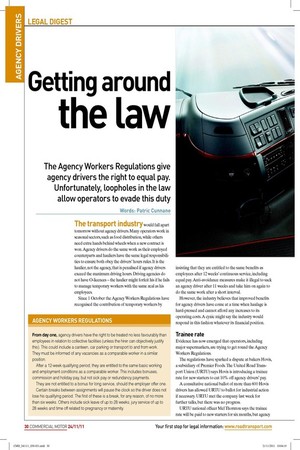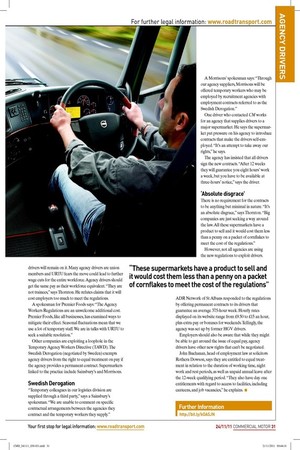Getting around
Page 23

Page 24

If you've noticed an error in this article please click here to report it so we can fix it.
the law
The Agency Workers Regulations give agency drivers the right to equal pay. Unfortunately, loopholes in the law allow operators to evade this duty
Words: Patric Cunnane The transport industry would fall apart tomorrow without agency drivers. Many operators work in seasonal sectors, such as food distribution, while others need extra hands behind wheels when a new contract is won. Agency drivers do the same work as their employed counterparts and hauliers have the same legal responsibilities to ensure both obey the drivers’ hours rules. It is the haulier, not the agency, that is penalised if agency drivers exceed the maximum driving hours. Driving agencies do not have O-licences – the haulier might forfeit his if he fails to manage temporary workers with the same zeal as his employees.
Since 1 October the Agency Workers Regulations have recognised the contribution of temporary workers by insisting that they are entitled to the same beneits as employees after 12 weeks’ continuous service, including equal pay. Anti-avoidance measures make it illegal to sack an agency driver after 11 weeks and take him on again to do the same work after a short interval.
However, the industry believes that improved beneits for agency drivers have come at a time when haulage is hard-pressed and cannot afford any increases to its operating costs. A cynic might say the industry would respond in this fashion whatever its inancial position.
Trainee rate
Evidence has now emerged that operators, including major supermarkets, are trying to get round the Agency Workers Regulations.
The regulations have sparked a dispute at bakers Hovis, a subsidiary of Premier Foods. The United Road Transport Union (URTU) says Hovis is introducing a trainee rate for new starters to cut 10% off agency drivers’ pay.
A consultative national ballot of more than 600 Hovis drivers has allowed URTU to ballot for industrial action if necessary. URTU met the company last week for further talks, but there was no progress.
URTU national oficer Mel Thornton says the trainee rate will be paid to new starters for six months, but agency drivers will remain on it. Many agency drivers are union members and URTU fears the move could lead to further wage cuts for the entire workforce. Agency drivers should get the same pay as their workforce equivalent. “They are not trainees,” says Thornton. He refutes claims that it will cost employers too much to meet the regulations.
A spokesman for Premier Foods says: “The Agency Workers Regulations are an unwelcome additional cost. Premier Foods, like all businesses, has examined ways to mitigate their effect. Seasonal luctuations mean that we use a lot of temporary staff. We are in talks with URTU to seek a suitable resolution.” Other companies are exploiting a loophole in the Temporary Agency Workers Directive (TAWD). The Swedish Derogation (negotiated by Sweden) exempts agency drivers from the right to equal treatment on pay if the agency provides a permanent contract. Supermarkets linked to the practice include Sainsbury’s and Morrisons.
Swedish Derogation
“Temporary colleagues in our logistics division are supplied through a third party,” says a Sainsbury’s spokesman. “We are unable to comment on speciic contractual arrangements between the agencies they contract and the temporary workers they supply.” A Morrisons’ spokesman says: “Through our agency suppliers, Morrisons will be offered temporary workers who may be employed by recruitment agencies with employment contracts referred to as the Swedish Derogation.” One driver who contacted CM works for an agency that supplies drivers to a major supermarket. He says the supermarket put pressure on his agency to introduce contracts that make the drivers self-employed. “It’s an attempt to take away our rights,” he says.
The agency has insisted that all drivers sign the new contracts. “After 12 weeks they will guarantee you eight hours’ work a week, but you have to be available at three-hours’ notice,” says the driver.
‘Absolute disgrace’
There is no requirement for the contracts to be anything but minimal in nature. “It’s an absolute disgrace,” says Thornton. “Big companies are just seeking a way around the law. All these supermarkets have a product to sell and it would cost them less than a penny on a packet of cornlakes to meet the cost of the regulations.” However, not all agencies are using the new regulations to exploit drivers.
ADR Network of St Albans responded to the regulations by offering permanent contracts to its drivers that guarantee an average 37.5-hour week. Hourly rates displayed on its website range from £9.50 to £15 an hour, plus extra pay or bonuses for weekends. Tellingly, the agency was set up by former HGV drivers.
Employers should also be aware that while they might be able to get around the issue of equal pay, agency drivers have other new rights that can’t be negotiated.
John Buchanan, head of employment law at solicitors Rothera Dowson, says they are entitled to equal treatment in relation to the duration of working time, night work and rest periods, as well as unpaid annual leave after the 12-week qualifying period. “They also have day one entitlements with regard to access to facilities, including canteens, and job vacancies,” he explains. ■













































